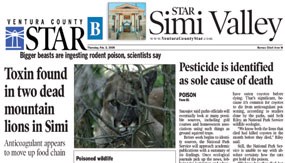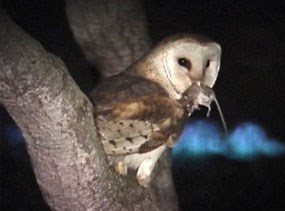|
What are anticoagulants? Anticoagulants are substances that prevent blood coagulation; that is, they stop blood from clotting. Often, pest-controlling chemicals intended to kill rats and other rodents, contain anticoagulant chemicals (e.g. brodificoum, diphacinone, warfarin, bromadialone, etc.) that cause fatal internal bleeding when consumed. Anticoagulant poisoning is not obvious for several days after the poison has been consumed but eventually it will cause internal bleeding and death.
Who's at risk? Both pets and wildlife are susceptible to anticoagulant poisoning. They may be poisoned by eating rodenticide directly, sometimes mistaking pellets for kibbled pet food, or indirectly by consuming a dead or dying rodent that has eaten the poison. Brodifacoum and other commonly used rodenticides are currently under review by the Environmental Protection Agency (EPA) due to concerns about potential harmful effects on wildlife and the accidental poisonings of pets and children. Consequences of Anticoagulants at the Urban Edge 
During the course of this study, 31 of 39 bobcats that died tested positive for anticoagulant poisoning. Being strict carnivores, biologists believe these bobcats acquired the poison indirectly by preying on rodents that had been poisoned. These poisons are often put out to control rodent populations around homes, apartment or office complexes, and golf courses. Bobcats are not the only wildlife that area affected by anticoagulant poisoning. Coyotes and mountain lions are also susceptible to the poison. Alternatives to Rodenticides Controlling rodents with poisons may seem like quick and easy, however, safer and more environmentally friendly options are available: 
Wild Wing Company
|
Last updated: March 1, 2015
